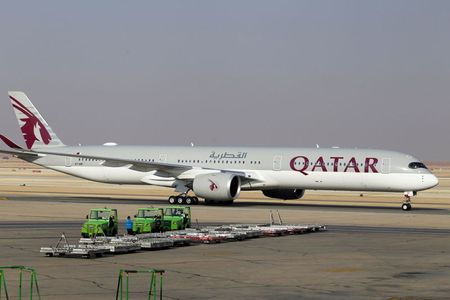By Alexander Cornwell
DUBAI (Reuters) -Saudi Arabia plans to target international transit passenger traffic with its new national airline, going head-to-head with Gulf giants Emirates and Qatar Airways and opening up a new front in simmering regional competition.
Crown Prince Mohammed bin Salman, who is pushing economic diversification to wean Saudi Arabia off oil revenues and create jobs, announced a transportation and logistics drive on Tuesday aimed at making the kingdom the fifth-biggest air transit hub.
Two people familiar with the matter said the new airline would boost international routes and echo existing Gulf carriers by carrying people from one country to another via connections in the kingdom, known in the industry as sixth-freedom traffic.
The transport ministry, which has not released details of the plans, did not respond to a Reuters request for comment.
The strategy marks a shift for Saudi Arabia whose other airlines, like state-owned Saudia and its low cost subsidiary flyadeal, mostly operate domestic services and point-to-point flights to and from the country of 35 million people.
The Saudi expansion threatens to sharpen a battle for passengers at a time when travel has been hit by the coronavirus pandemic. Long-haul flights like those operated by Emirates and Qatar Airways are forecast to take the longest to recover.
Riyadh has already moved to compete with the UAE, the region’s business, trade and tourism hub. The Saudi government has said that from 2024 it would stop giving contracts to firms that do not set up regional headquarters in the kingdom.
“Commercial competition in the aviation industry has always been fierce, and regional competition is heating up. Some turbulence in regional relations is on the horizon,” said Robert Mogielnicki, resident scholar at the Arab Gulf States Institute.
Dubai, the world’s largest international air travel hub, has announced a five-year plan to grow air and shipping routes by 50% and double tourism capacity over the next two decades.
Riyadh has already moved to compete with the UAE, the region’s business, trade and tourism hub. The Saudi government has said that starting 2024 it would stop giving contracts to firms that do not set up regional headquarters in the kingdom.
Prince Mohammed is trying to lure foreign capital to create new industries including tourism, with ambitions to increase overall visitors to 100 million by 2030 from 40 million in 2019.
“Saudi Arabia has the ability to push forward with its aviation and tourism strategy when others will be retreating and retracting,” aviation consultant Brendan Sobie said.
“It is a risky strategy, but also sensible given its position and overall diversification objective.”
TOURISM PUSH
However, any airline requires substantial start-up capital and experts warn that if Saudi Arabia’s ambition is to compete on transit flights it may have to contend with years of losses.
Saudi Arabia’s large population generates direct traffic that could cushion losses as a new airline targets international transit traffic, aviation consultant John Strickland said.
Emirates reported a record $5.5 billion annual loss last month with the pandemic forcing Dubai to step in with $3.1 billion in state support.
Etihad Airways has scaled back its ambitions after it spent billions of dollars to ultimately unsuccessfully compete in building a major hub in United Arab Emirates capital Abu Dhabi.
People familiar with the matter said the new airline could be based in the capital Riyadh, and that sovereign wealth fund PIF is helping set it up.
PIF did not respond to a request for comment.
Saudi Arabia is developing non-religious tourism with mega projects backed by PIF. It has launched social reforms to open up the country, the birthplace of Islam, including allowing public entertainment.
(Reporting by Alexander Cornwell; Editing by Tim Hepher and Alexander Smith)





